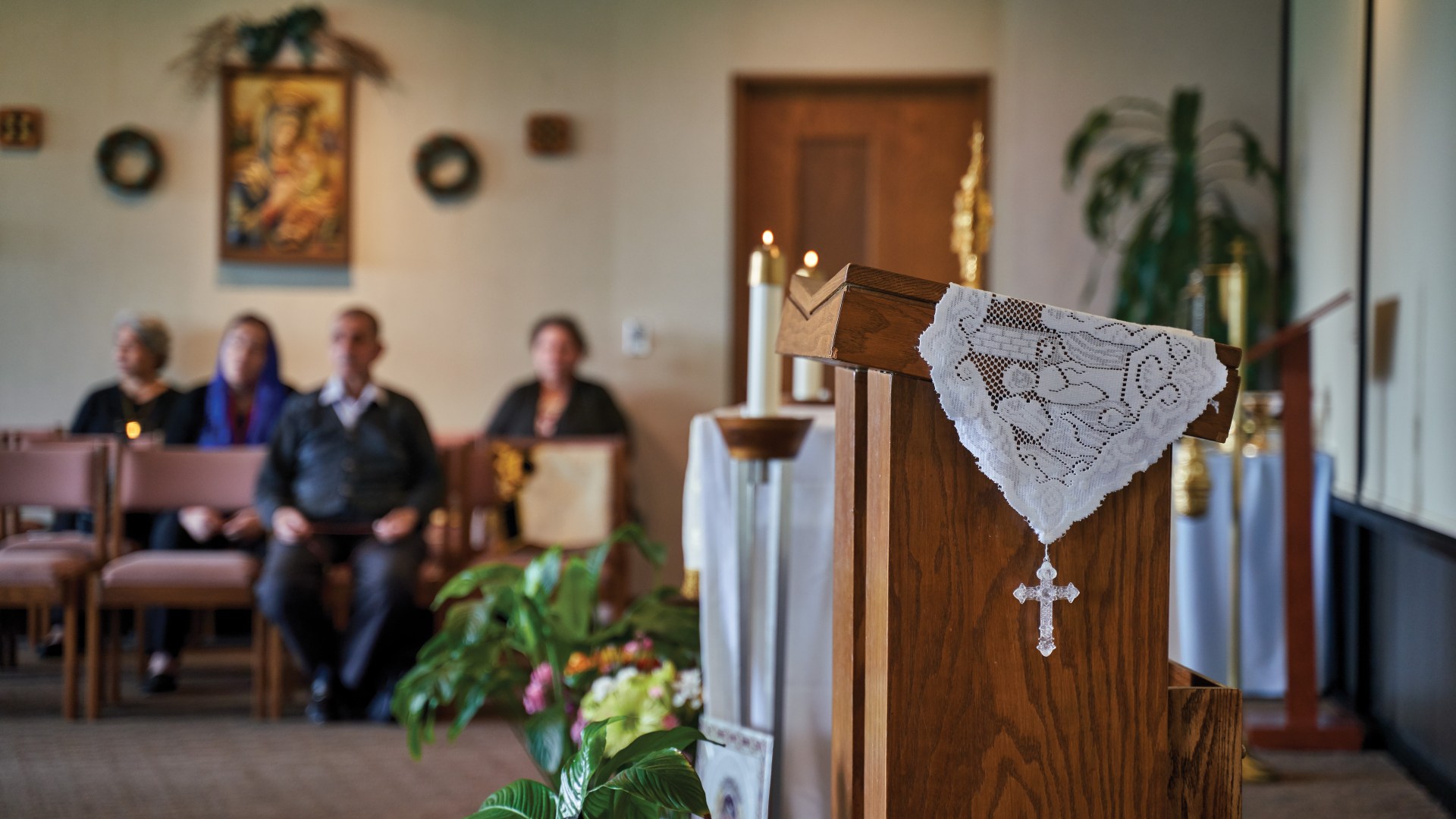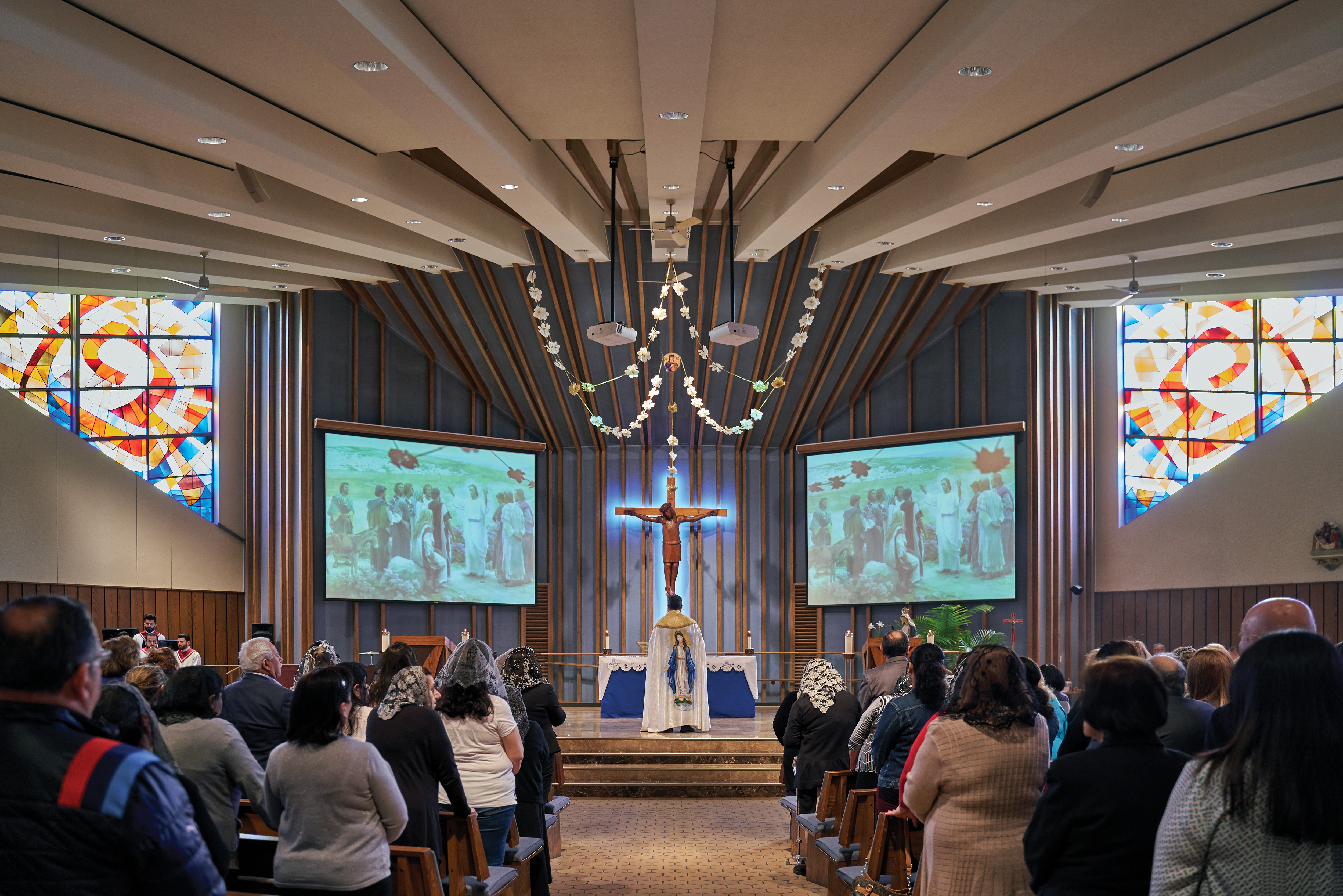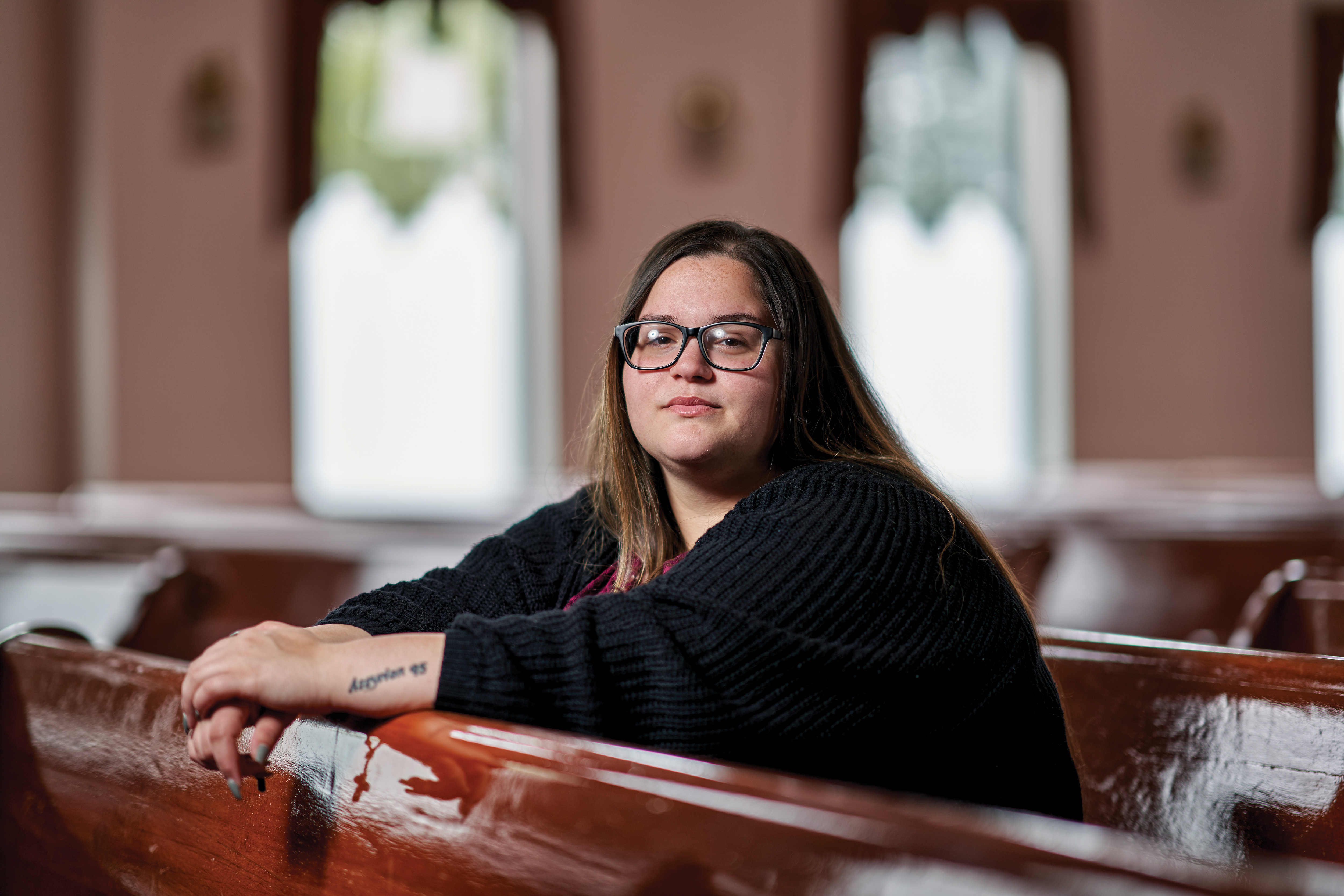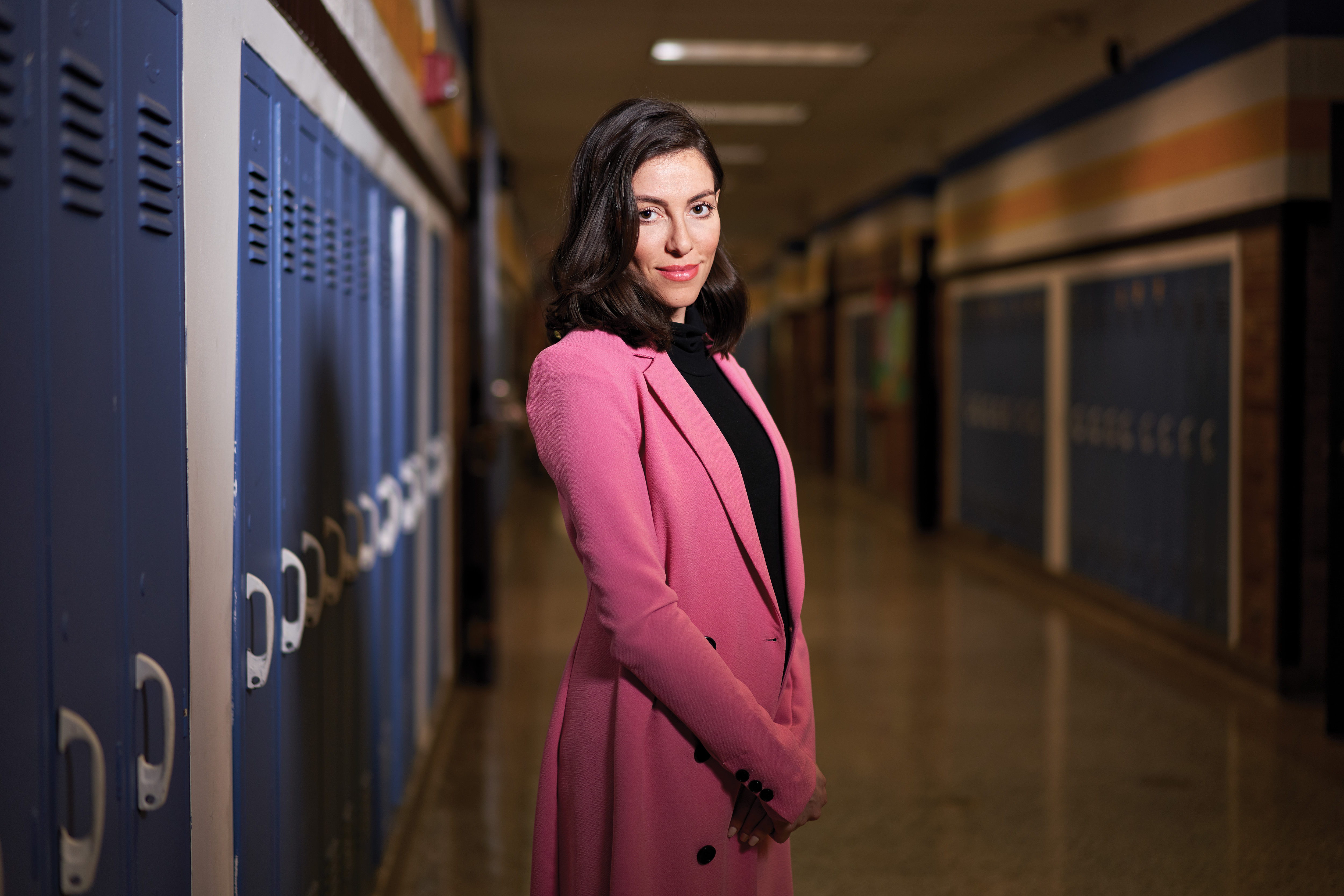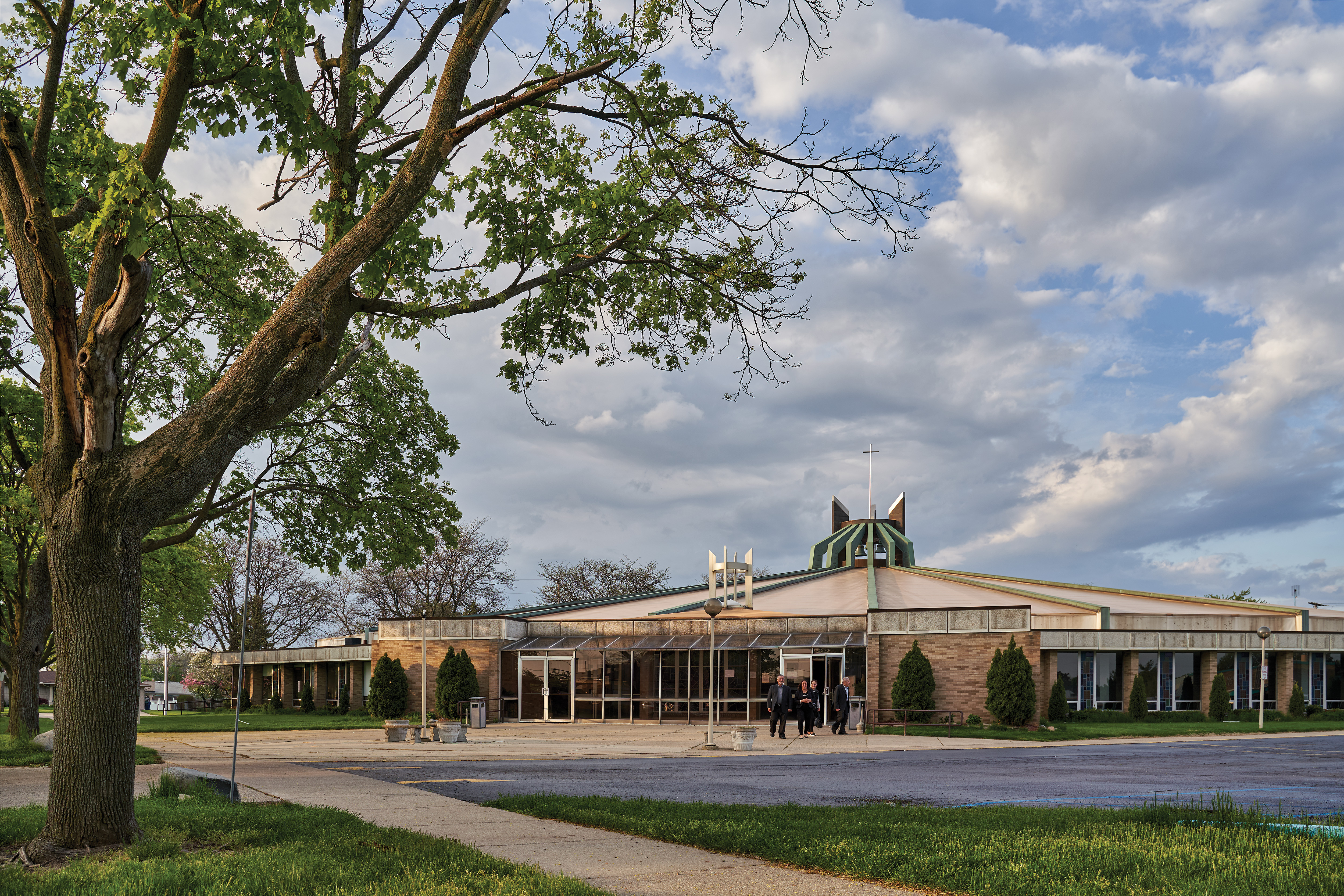Standing in the small chapel at Our Lady of Perpetual Help on a crisp April morning, it would be easy to exoticize the Iraqi worshipers, gathered for Monday Mass and tethered to ancient roots. The lingering aroma of incense clings to the thick carpet and dark upholstery of the Chaldean Catholic church in suburban Detroit. The ornate icons, candles, and rosaries evoke a more gilded era of Catholicism. Chanting in Arabic, some of the women gently sway under delicate white lace veils.
It doesn’t look like a community on the brink of being torn apart.
When news broke in the summer of 2017 that the US government planned to deport 1,400 Iraqis, it sounded at a national level like yet another immigration story. Mostly men with felony records, the group had been living under “final orders of removal”: a judicial sentence deferred for 5, 10, 20, and even 30 years in some cases because of continuing instability in Iraq.
But a closer look at one of the largest concentrations of Iraqi American Christians, Detroit’s Chaldean community, reveals a portrait of a people whose past and future are deeply interwoven with colliding interests and cultures. It is, in short, a more American story.
It also illustrates how the near-universal sympathy of American Christians for the persecuted church abroad clashes with their divided political views back home. And not just views on immigration policies. The Chaldean Christians’ presence in the United States, their experience here, and the threat of their forced return to Iraq—something many of them consider a death sentence—are inseparable from America’s foreign policy, criminal justice system, and economic inequities.
Foreign Entanglements
In the aftermath of the Gulf War, John and Rumel Aslivo’s father was killed in 1991 while working as a local contractor for the US government’s Military Coordination Center in Iraq. Since that time, increasing numbers of Iraqi civilians have worked as US fixers, translators, and security personnel. In 2007, the Los Angeles Times reported that about 118,000 Iraqi civilians were under contract with the US Armed Forces.
To support his five siblings and mother, 15-year-old John followed in his father’s footsteps, working for the Office of US Foreign Disaster Assistance—and strengthening the family’s bond to an American military that seemed ever present.
Though huge numbers of America’s living veterans and active servicemen and women have served in Iraq over the course of two wars—the Gulf War (1990–91) and the Iraq War (2003–2011)—for most civilians the Middle Eastern nation remains mysterious and “other.”
Evangelicals were among the first Americans to travel to the region—then known as Mesopotamia—during a foreign missions boom in the 1830s. As industrious as those missionaries were in founding schools and hospitals, evangelism did not ultimately lead to the now well-trodden path between the US and Iraq. Oil did.
American economic interests in the region predate the creation of an independent Iraqi state. In 1928, a year after oil was discovered, five American oil companies formed a consortium that took 23.75 percent ownership in the Iraq Petroleum Company.
At the same time that oil was drawing Americans to Iraq, it was pulling Iraq’s historic Catholics to the US. Beginning around 1910, rural Chaldeans in search of better economic opportunity began making their way to Detroit, where the automobile industry was booming. They established a community that continued to grow throughout the 20th century as adherents to the ancient Christian tradition faced growing persecution across the Middle East.
The Chaldean Chamber of Commerce, headquartered in the Detroit Metro Area, estimates that of the 500,000 Chaldeans living in the US, 160,000 live in and around Detroit.
The Aslivos are among them. Because of John’s job with the US government, the family was included in a massive evacuation following Operation Desert Strike in 1996. Once in America, they made their way to Detroit, where they knew they could find cultural and religious support.
They settled in the only neighborhood they could afford: Seven Mile. John soon joined the military, training US troops in language and culture ahead of deployment to Iraq. In contrast, Rumel stayed behind and started down a path similar to many local young men.
Detroit City Limits
Six years after the Aslivos arrived, the rapper Eminem would grant national notoriety to the adjacent Eight Mile neighborhood in an eponymous film about poverty, violence, and segregation in Detroit. More recently, a six-part documentary on YouTube explores how the Seven Mile Bloods gang controlled Detroit’s east side through violence and racketeering for decades, while drugs moved freely through the streets. If Eight Mile is the border between a struggling major city and its more affluent suburbs, neighboring Seven Mile is one layer deeper into the struggle.
Rumel was 13 when he arrived in Seven Mile. The unemployment rate in urban Detroit was 10 percent, and the city was in the midst of a widely reported depopulation—a downward trend that continues today.
He became one of thousands of youth in a hollowed-out economy with few legitimate avenues to earn a living wage.
Today, at 36, Rumel looks athletic. He has a square jaw, compact build, and steady gaze. When he met CT in April 2019, he was awaiting the imminent arrival of his first daughter. He showed up at the cozy office of Our Lady of Perpetual Help priest Fadi Philip with Tim Horton’s coffee for everyone.
Despite being a husband and expectant father, employed and churchgoing in suburban Detroit, Rumel still carries a remnant of the Seven Mile swagger he earned surviving as a poor immigrant kid running with a tough crowd. He makes no excuses. “I got caught up with them,” he said.

In 2003, he was driving a car for some friends with drugs on them. Because of the amount, the police charged everyone in the car with intent to sell. Rumel pleaded guilty to controlled substance delivery, a misdemeanor. In 2007, he was arrested on the same charge—only this time, it was a felony because of the amount of drugs in the car.
During those years, the US Bureau of Justice Statistics reported that in America’s 75 largest counties, less than 1 percent of drug offenses like Rumel’s went to trial. Virtually everyone took a plea deal. Rumel had signed a guilty plea in 2003, not understanding that it would make the second conviction more severe. He signed the 2007 felony plea not knowing that US Immigration and Customs Enforcement (ICE) would be waiting outside to deliver what is known as a final order of removal. He was now deportable, with no possibility of obtaining a green card or US citizenship. The only thing keeping him in America was the fact that Iraq wouldn’t take him.
With only a few exceptions, Iraq has refused to accept deportees since the Iraq War, saying the Arab government cannot ensure their safety. While violent persecution has lessened since ISIS was forced back and largely defeated in the region, Open Doors still ranks Iraq as No. 13 among the 50 nations where it’s most dangerous to follow Jesus. Many religious freedom advocates and even governments—including the US State Department in March 2016—have pointed to the declining Christian population as evidence of genocidal efforts against religious minorities.
In contrast, the US Supreme Court declined this May to hear the appeal of a Chaldean man who spent five years in prison on a drug conviction and was fighting his deportation to Iraq under the UN Convention Against Torture. (However, neither the high court nor the prior appeals court ruled on the merits of his fear of torture for being Christian.)
Like the rest of the 1,400 Iraqis marked for deportation, Rumel served his time and went on with his life, regularly checking in with immigration officials. In 2018, Detroit announced Project Clean Slate to help felons get their records expunged. Such “second chance” programs are widely popular and have support among most Christians, who also believe—more strongly than the general population—that restoration should be the goal of America’s criminal justice system.
A Barna Group study sponsored by Prison Fellowship, which founded Second Chance Month in April 2017, reported in 2018 that almost all practicing evangelicals agree strongly (61%) or somewhat (38%) with the following statement: “Once someone with a criminal history has completed their just punishment, they deserve a second chance to become productive members of the community.”

Rumel would be eligible for such a program, but it wouldn’t help him in immigration court. Even expunged or sealed records don’t undo final orders of removal. For immigrants, there are no second chances.
And Philip, the priest at Our Lady of Perpetual Help, explains without equivocation: For Iraqi Christians in his church who have Americanized, like Rumel, deportation is a death sentence.
The 1,400
Ashourina Slewo was 21 years old when she answered the phone on Sunday, June 11, 2017. It was a family friend in California, looking for her father. “Tell your dad to get out of Michigan,” she recalls the friend saying. The roundups had begun again.
Three months prior, the US government had provided a list of about 1,400 names to the Iraqi government. These were the deportees the US wanted to repatriate to Iraq in exchange for removing the nation from President Donald Trump’s travel ban.
Court documents later revealed a group of eight Iraqis had been deported that April, only to sit on a tarmac in Iraq for hours while the two governments negotiated. They eventually got off the plane, but internal ICE memos indicate the agency was doubtful that another such maneuver would be successful.
The Chaldeans had been confident they would not be deported, Slewo said. They had vocally supported Trump’s candidacy, as he promised to protect persecuted Christians.That promise helped Trump flip Macomb County, home to many Detroit-area Chaldeans with US citizenship, and pull swing state Michigan into his column, helping him secure the presidency. As Chaldean leader Martin Manna told the Christian Post in 2016, “Our community voted like it never has.”
One of those supporters was Slewo’s father. As a non-citizen, he couldn’t vote, but he was vocal in encouraging other Chaldeans to vote for Hillary Clinton’s rival. Many in the community openly expressed their confidence in Trump, saying, as Chaldean lawyer Nadine Kalasho recalled to CT, “There’s no way he’s going to send Christians back.”
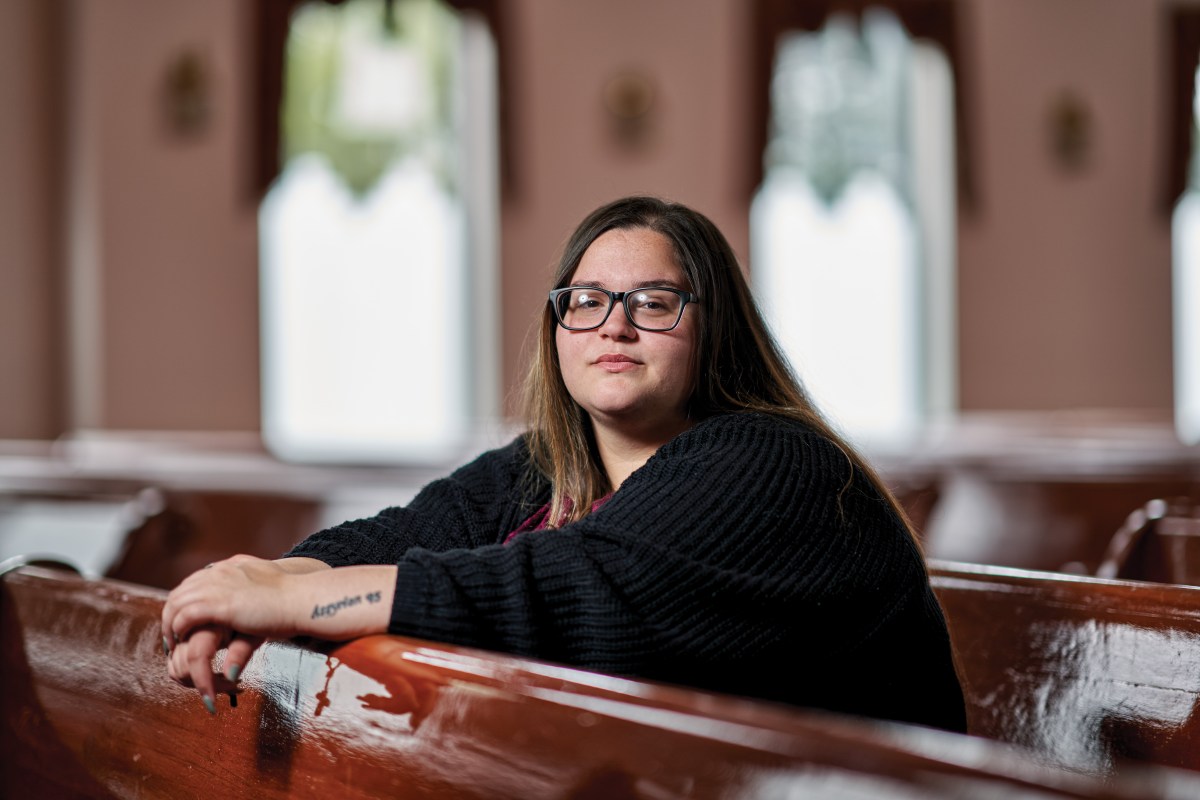
But some of those Christians were also convicted felons, a group Trump had vowed to target for immigration enforcement. The problem, Kalasho said, is that “felon” sounds dangerous. It’s hard to argue that someone dangerous should be allowed to stay in the US. But for immigrants from Arab countries, a felony conviction is easier to get than one might think.
The Cato Institute, a Libertarian think tank, concluded in March that immigrants commit crimes at lower rates than the general US population, according to studies from both immigrant advocates and criminologists. Still, Kalasho has observed that those who do end up in court—especially those with dark skin or non-white facial features, who do not speak English as their first language, or who come from cultures where remorse is expressed differently than in America—are unlikely to get a reduced sentence or total acquittal. “The justice system for brown folks in general is bad; for immigrant communities, it’s terrible,” she said.
Carlos Berdejó, a researcher at Loyola Law School, found that plea deals tend to discriminate against minority defendants. He found that first-time defendants who are black can’t “plea down” their charges as successfully as first-time white defendants for the same crimes. The Equal Justice Initiative, led by Christian lawyer Bryan Stevenson, has highlighted Berdejó’s work amid its ongoing investigation of racial bias in the US justice system.
A lot of felonies that end in final deportation orders relate to domestic violence, several Detroit Chaldeans told CT. Behavior that is often permissible within marriages in Iraq is considered abusive in the US. Because immigrant women now have a way to make it stop—calling the police—they often do.
That’s the American system working as it should, but there’s a twist. It’s unlikely, several sources agreed, that the women (like the one who filed charges against Slewo’s father) anticipated that their husbands and boyfriends would be deported to Iraq because of those charges.
In the time that immigrants have been granted temporary reprieves from deportation, they often become parents, spouses, and caretakers, said Alan Cross, a Southern Baptist pastor from Alabama. Cross has written on racial reconciliation and immigration in the South and works with the Evangelical Immigration Table.
“Family unity is obviously something we believe in,” Cross said. He’s also concerned that automatic deportation erodes judicial sentencing discretion, something Barna found 85 percent of practicing evangelicals support. In the years since many of the Chaldeans have stood before a judge, their situation has changed. Immigration judges need the chance to consider that, Cross argues.
Rumel is now spiritually far from where he had been as a wayward youth, but some of his stability has to do with geography as well. He had left Seven Mile for the quiet suburbs, where there was less trouble at his doorstep. And he had never really been the type to go looking for it. “He’s a good guy,” Philip said.
Rumel was walking out his front door to go to church when ICE officers arrested him on June 11, 2017. Others made it to their churches that Sunday, only to find ICE and deputized local law enforcement waiting in the parking lots when they exited. Almost 200 Chaldeans were taken into ICE custody across the country; more than half were from Detroit. Michigan Public Radio reported that of the 1,400, a total of 400 eventually ended up in detention for some period of time.
Slewo was with her father when he was arrested. As he was led away, hands zip-tied behind him, she said he suddenly began to cry out—begging her not to forget him.
“I thought that was the last time I was going to see my dad,” she said. “I just kind of stood in the middle of the street, my mouth gaping.”
Throughout the afternoon, her phone buzzed with news of other arrests. Slewo writes for The Chaldean News, a local newspaper. People assumed she’d want to know. “At that point, if the ground had opened up and swallowed me whole I would not have objected,” she said.
Strange Bedfellows
Once she realized that a roundup was afoot, Kalasho, the lawyer, began circulating “Know Your Rights” material via social media. As arrests topped 20, then 30, then 40, she knew she was out of her depth. As part of a two-person team at a legal aid nonprofit, she mostly handled small domestic issues and minor civil cases. But she was a Chaldean, a member of the community, and people trusted her.
Kalasho called friends who worked with the Michigan Immigrant Rights Center and the American Civil Liberties Union (ACLU). Members of the Arab Muslim community also jumped into action. “They’ve been in panic mode hundreds of times,” she said. “This was our first panic mode.” From there, they filed a class action lawsuit that would allow the Iraqis to stay in the US. Hamama v. Adducci would work its way through the courts for the next two years.
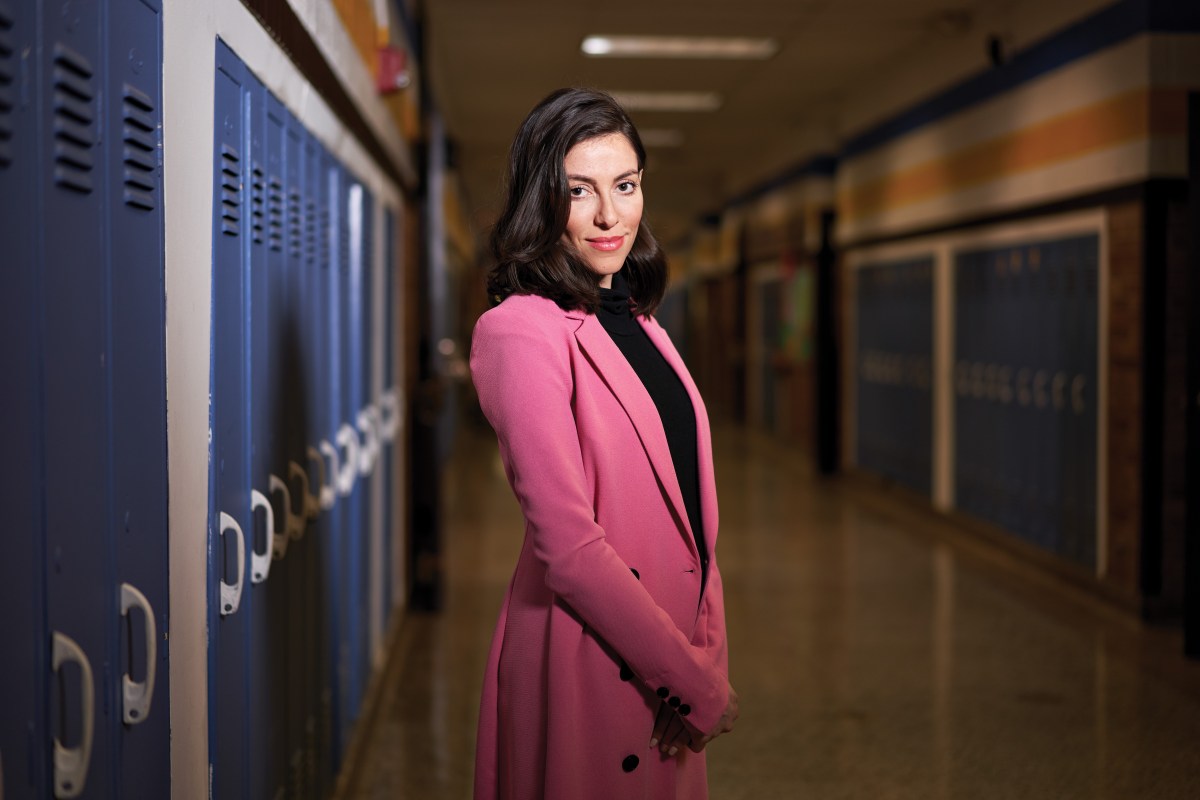
At first, according to Kalasho, the Chaldean community resisted the involvement of the ACLU, which they associate with abortion and gay rights. Their reservations are common among Christians who wade into immigration advocacy, where some of the most active organizations take progressive stances on LGBT discrimination and reproductive health. “Our community’s identity comes from the church,” she said. They had “never really identified with the immigration struggle.”
And it wasn’t just aversion to the ACLU. Many Chaldeans think of themselves as American Christians, not as Iraqi immigrants. They assumed their neighbors saw the same. But Kalasho and Slewo say they knew better. “Our names are different. Our skin is different,” Kalasho said. “[ICE isn’t] going to differentiate just because you have a cross around your neck.”
Many Chaldeans identified with the anti-Muslim sentiments Trump frequently expressed. Some saw Trump as the enemy of their enemy—and thus, their friend.
“Our community was digging a grave for the Muslim community,” Slewo said. “But it will be us that fall into it.”
A portion of the community, Kalasho said, chose to ignore much of what would follow: protests, press conferences, and court dates. They didn’t want the stain of felons on their hands.
Like the Chaldeans, pastor Jacob Kakish—whose Arabic Evangelical Alliance Church is five miles from Our Lady of Perpetual Help—considers Arab evangelicals in the Detroit area to be the kind who assimilate and thrive. They hail from Muslim-majority countries such as Egypt, Syria, Yemen, and Saudi Arabia, and their churches have helped them succeed in the US. With only 1 of his 300 members caught up in the raids, Kakish said the impact was small for his church. Rather than getting involved in legal battles, his primary concern has remained—as his church’s website, arabs4jesus.com, suggests—making sure Arabic speakers hear the gospel.
Long Months and Holy Weeks
Rumel was in detention for eight months in Youngstown, Ohio, about four and a half hours from Detroit. Philip visited him regularly and comforted his family back home.
Then Judge Mark Goldsmith ruled that those in detention would receive bond hearings and could request a hearing with an immigration court.
Rumel got out on bond in February 2018. Slewo’s father got out the following month. Like most, their hearings in a heavily backlogged immigration court are scheduled for 2021 and 2022, respectively.
Some of Kalasho’s clients qualified for a waiver of their final orders of removal and even managed to get green cards. Some are working toward citizenship. “There is a pathway for a lot of them,” she said.
Those still in limbo were waiting for a final ruling on Hamama v. Adducci.

By Holy Week last year, the grueling work and constant litigation of the past 10 months had worn Kalasho thin. When the call-and-response in the Good Friday liturgy cued the crowd to shout Give us Barabbas! and Crucify him!, she couldn’t do it. The words rang in her ears like the anti-immigrant rhetoric she heard day in and day out.
The Sixth Circuit Court of Appeals took up Hamama v. Adducci in April 2018, a couple of weeks after Easter. On April 2 of this year, the court ruled that the deportation of Chaldeans could finally begin.
Twelve days later, the implications of the ruling were rippling through the community, even in middle-class pockets that attest to how Detroit’s Chaldeans have thrived over the last century.
The Sunday night English Mass at Mother of God could not be more different from the humble Monday morning Arabic Mass at Our Lady of Perpetual Help. Nestled in the comfortable Southfield neighborhood, the parking lot at the cathedral for Detroit’s Chaldean diocese was filled with luxury sedans and late-model family SUVs. The Palm Sunday crowd inside was multigenerational and middle-class. Kids posed for palm frond photos.
The homily was exactly like what one might hear in any number of American churches. “Holy Week should be different,” priest Patrick Setto explained, describing how Christians should make the most of the time by laying down their idols and looking at what God may be doing instead.
Then he mentioned something that for this group, in the wake of the appeals court decision, likely had special significance. “I hear a lot of you say that you are anxious,” he said. “Anxiety is about control. You must lay down the desire and expectation that God will do a certain thing.”
Slewo’s father is safe for now, waiting for his immigration hearing in three years. She’s trying to figure out if he could get a special waiver like some of Kalasho’s clients.
While Rumel also has years to wait, watching his American daughter grow up, he is pretty sure no such route exists for him. He’s just praying the immigration judge in 2021 will see it his way: Yes, he screwed up. But he screwed up like an American, and America is where he belongs.
Bekah McNeel is immigrant communities editor for Christianity Today.
Have something to say about this topic? Let us know here.

